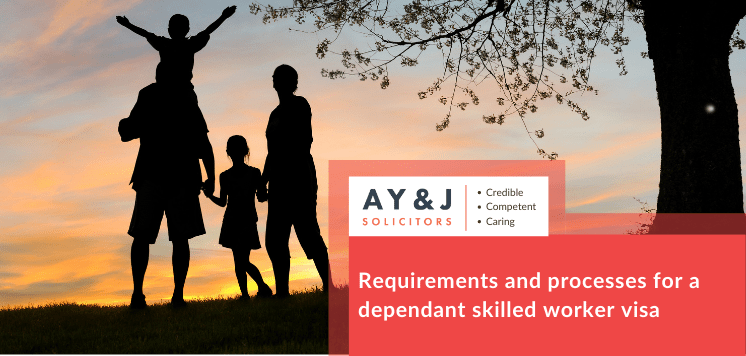As an employer, you need a sponsor licence to sponsor a skilled worker from outside the UK to work for you. Since 1 January 2021, under the UK’s new immigration system, any EU citizen (excluding Irish nationals) arriving in the UK must inevitably be sponsored by their employers and need to apply for the relevant work visa.
The major visa route available for EEA nationals and non-EEA nationals to work in the UK is a Skilled Worker visa.
To begin with, the prospective employer needs to secure a Sponsor Licence. A Sponsor Licence will enable the employer to assign a Certificate of Sponsorship (CoS) to the prospective employer, and then the employee can apply to the Home Office for a Skilled Worker visa to work for that employer.
Provided that an organisation is able to demonstrate that they meet the eligibility and suitability requirements, it can secure a Sponsor Licence. But this is not the end to it; the Home Office guidance states that sponsorship is a privilege, not a right. This means that those who benefit most directly from employing migrant workers must play their part in ensuring the immigration system is not abused (aka complying with their sponsor duties), comply with wider UK law and not behave in a manner that is not conducive to the public good.
Fulfilling the sponsorship duties is paramount and inescapable to ensure that the organisation is able to retain its Skilled Worker employees.
Many organisations attract Sponsor Licence revocation or cancellations by overlooking their sponsorship duties or doing untimely compliance activities.
In this blog, we will cover core sponsorship duties to fulfil as a Skilled Worker Sponsor. Let us get started.
Understanding the Guiding principles
Having a Sponsor Licence is a privilege and not a right on its own. The Home Office places considerable trust on the licenced sponsors to ensure regular compliance to the UK immigration law, their sponsor duties and wider UK law and behaves in a ‘conducive manner’ which is for the general good.
Core objectives of the sponsorship duties
In order to demonstrate that a licenced sponsors will regularly comply with UK law and behave conducive, they must fulfil their sponsorship obligations and duties. Specific duties are universal to all the sponsors, while some are route-specific.
Objectives of the duties are as follows:
- Prevention of abuse of immigration laws and sponsorship system;
- Be vigilant in identifying any patterns of behaviour that may cause concern;
- Addressing weaknesses in the process which can cause those patterns, if any;
- Keeping track of compliance with the Immigration Rules, such as all parts of the Worker and Temporary Worker sponsor guidance, and employment law;
- Ensuring sponsors do not behave irresponsibly against the public good.
How do I know when my sponsorship duties begin?
As a licensed sponsor, your sponsorship compliance and duties begin from the date you are granted a Sponsor Licence and will apply until either your licence is revoked, suspended, expires, or you decide to surrender your licence.
Furthermore, you will be strictly observed and assessed based on actions and behaviour towards the UK immigration law, outside the ‘life-cycle of your licence.
As a licensed sponsor, your obligation towards each worker you hire begins when you assign a Certificate of Sponsorship (CoS) to them. However, this could also come to an end if any event occurs, such as;
- Worker’s leave the UK, and their entry clearance (work permission) expires or lapses;
- Worker’s application for the entry clearance (visa application) gets refused or is cancelled, and any administrative review or appeal rights have been spent or exhausted;
- Worker has been granted entry clearance or permission to work for a different sponsor;
- Worker has been granted Indefinite Leave to Remain in the UK or permission to stay on another immigration route that does not require sponsorship on the Worker or Temporary Worker routes;
- Sponsor (employer) informs the Home Office that they are no longer sponsoring the worker for any other reason; for example, you have laid them off, or they have resigned.
Understanding the core sponsorship duties
There are four broad categories of sponsorship duties that every licenced employer must fulfil to avoid any threats of sponsorship licence revocation or suspension.
❖ Monitoring and reporting duties
As a licenced sponsor, the reporting duties involve reporting certain information or events to the Home Office via Sponsorship Management System (SMS) within a stipulated time frame.
Do you have a way to calculate the Skilled Worker Visa UK cost?
Yes! Use our calculator below to calculate your Skilled Worker Visa cost.
Please answer the questions and you will be able to calculate the approx. cost for The Skilled Worker Visa –
Reporting the change of events within 10 working days
- If a sponsored worker does not begin with the role for which they are being sponsored;
- If a sponsored worker is absent from work for more than 10 continuous working days without permission;
- If a sponsored worker’s contract of employment or contract for services or any relevant professional registration ends earlier than mentioned on their CoS;
- If you have stopped sponsoring a worker for any other reason;
- Workers are absent from work without pay for more than 4 weeks, and this absence is not mentioned in any of the exceptions (such as statutory maternity/paternity leave, statutory adoption leave, sick leave);
- If there are any sponsored worker’s employment changes, such as promotion or change in job title or core duties;
- If the location where the workers are employed at changes, such as change of client’s site;
- If the employment of the sponsored workers is affected by TUPE (Transfer of Undertakings- Protection of Employment Regulations 2006);
- If the sponsor changes but the worker continue to work for the same employer and in the same employment;
- If the size of your organisation changes.
Reporting the change of events within 20 working days
- Change in company’s name or any of the branches
- Selling all or a part of the Company
- The Company is involved in a merger or are taken over
- The Company stopped trading
- Significant change like the nature of the business
- The key personnel are convicted of a relevant offence
❖ Record-keeping duties
An essential part of compliance for any sponsor is to fulfil the ‘Record-keeping’ duties. It entails keeping all the necessary documents of the skilled staff, including their Biometric Residence Permit (BRP). These documents can be stored either manually or electronically and must be produced whenever the Home Office needs them for assessment purposes.
The Home Office may also ask you to produce any document pertaining to the recruitment practices being followed so that they can be satisfied that the job offered to the worker is genuine.
Failure to produce the documents as and when asked by the Home Office, the employer may likely attract strict implications.
❖ Ensure legal working
From 1 January 2021, every employer in the UK must ensure prevention from illegal working.
Every employer is predisposed to civil penalties, even if the work check is done by a member of your staff or a third party such as a recruitment agency.
There could be adverse impacts on the health and safeguarding obligations, as well as potentially nullifying your insurance if the identity, qualifications, and skill levels of your workers are not ascertained.
❖ Complying with the UK Law
All prospective employers must comply with the sponsor licence guidelines for workers and temporary workers. Employers must ensure to hire skilled, professional and experienced staff for the job. In addition, the relevant documents pertaining to the registration must be kept with the employer as the Home Office may require, at any point, to check whether the worker fulfils the requirements.
The employer must not assign a certificate of sponsorship (CoS) if there is no genuine vacancy. Furthermore, if the Home Office gets to know about the illegal hiring of the workers during any compliance audits, your licence will be subjected to suspension or revocation.
CoS must be assigned only to those who intend and can fulfil the job role and immigration requirements.
❖ Key personnel
The key personnel are basically four positions in your organisation to fulfil specific responsibilities on the Sponsorship Management System (SMS).
- Authorising officer
- Key Contact
- Level 1 User
- Level 2 User
An Authorised Officer is a senior member in the organisation responsible for recruiting the workers. In addition, the Authorising officers ensure how many staff members are to be given access to the Sponsorship management system (SMS). They are also responsible for all the activities of SMS and its compliance.
The Key Contact is usually the primary contact between the organisation and the Home Office. The Home Office will contact the organisation through the Key Contact if there is any query about your sponsor licence application, documents, or payment.
Level 1 and level 2 users will have access and are generally the ones taking care of the SMS. They are responsible for assigning the CoS, reporting any change of circumstances, accessing key messages, renewing the licence and tracking the application.
Conclusion: Understanding and fulfilling the sponsorship duties are crucial for any employer who seeks to hire overseas staff. Else there could be some severe repercussions in the form of downgrading your licence, hefty civil penalties, suspension, or revocation of Sponsor Licence. This blog outlines the core sponsorship duties that every employer must comply with to avoid any enforcement action being taken by the Home Office. However, suppose there is any overlooking intentional or unintentional in Sponsor Licence compliance. In that case, it could severely impact your organisation’s reputation to the extent that you could be disallowed from hiring overseas skilled workers and have restricted business activity.








